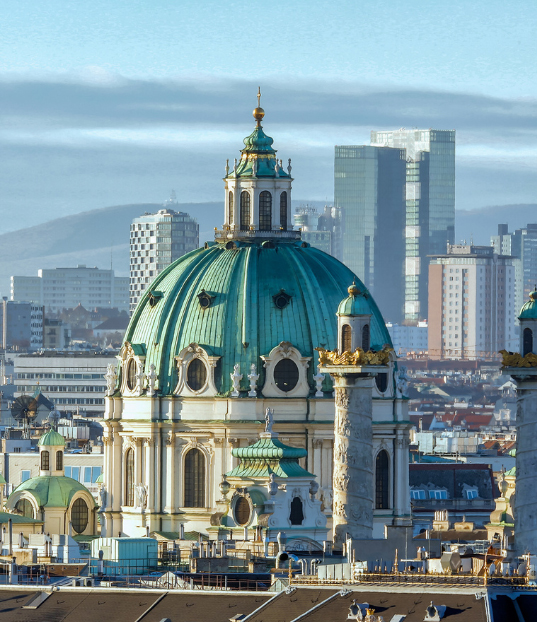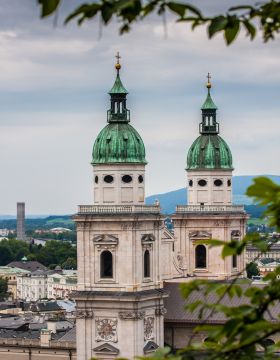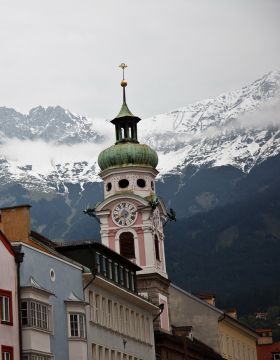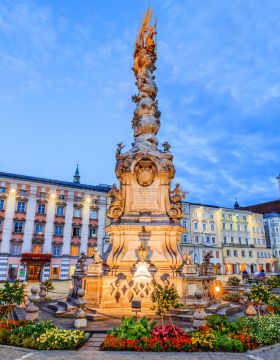Comprehensive Guide on Removal To Austria
Moving to a new country can be an exciting but daunting experience. Whether you are relocating for work, school, or simply to start a new life, it is important to have a comprehensive understanding of the country and its culture before making the move. Austria is a stunning country in Central Europe with a high standard of living, rich cultural heritage, and breathtaking natural beauty.
From the rolling hills of the Austrian Alps to the historic architecture of its cities, there is something for everyone in this charming country. If you are considering a move to Austria, it is important to be well-informed and prepared. This comprehensive guide will provide you with all the information you need to make the transition to life in Austria as smooth as possible. This guide will cover everything from visa requirements to finding a place to live, learning the language, and navigating the country’s transportation system. Additionally, it will provide tips on fully integrating into Austrian society, experiencing its vibrant cultural scene, and enjoying all this beautiful country has to offer.
When selecting a moving service in Austria, it is important to ensure you are dealing with a reputable company that follows best practices.
Relocating to Austria can be daunting, and it’s important to ensure you have the right moving company in Austria. ISS Relocations is a global provider of comprehensive relocation services and has been trusted by individuals and companies for over three decades.
We offer a complete range of services for those relocating to Austria. This includes door-to-door moving services in Austria, packing and unpacking services, and much more.
Benefits of Removal to Austria
Moving to Austria can be a great experience for those who are looking for a new country with plenty of opportunities. If you’re planning such a move, here are some benefits to consider:
- Unique Culture: Austria is home to an incredibly diverse culture and history with influences from both the east and west.
- Affordable Living: Property prices in Austria are significantly lower than in most other European countries, making living costs much more manageable.
- Stability: As one of the safest European countries, moving to Austria will provide stability for you and your family.
- Vibrant City Life: Viennese culture is vibrant and exciting, with plenty of entertainment venues to explore and enjoy.
- Easy Moving Process: Professional removal companies can help make relocating to Austria much easier by providing reliable relocation services that ensure your items are moved without any hassles or delays.
Get A Free Moving Quote Today
"*" indicates required fields

How To Move To Austria?
If you’re looking to move to Austria, there are a few things to consider. To begin with, you will need to decide whether or not you want to become a permanent resident or a temporary one. If you choose the former, you must submit an application for residence authorization. Once your application is approved, you will be able to apply for a work permit and, if necessary, a visa. If you choose to stay as a temporary resident, you will only need to register with the local authorities to reside in Austria.
Another important thing to consider is finding suitable accommodation. Depending on your budget and preferences, many options are available for long-term or short-term stays. You should also look into the various housing options available, such as flats, apartments, or student dormitories.
Lastly, you will need to look into getting a job in Austria. With a good level of proficiency and the necessary qualifications, it is possible to find employment with ease. There are many job search websites, such as Monster and Stepstone, where you can find suitable positions.
It is worth noting that the Austrian government has strict regulations regarding immigration, so it is important to ensure that you have all of your documents in order before you start looking for work. Once everything is sorted out, you will be able to enjoy Austria’s beautiful scenery and friendly people.
At ISS Relocations, the premier movers and packers in Austria, we offer personalized advice and 24-hour aid to ensure your move is successful. We also provide the necessary resources to facilitate a smooth transition into your new home.
ISS Relocations offers moving services to and from Austria to:
Dubai, UAE Oman Qatar Bahrain Saudi Arabia Kuwait India

Effortless Relocation to Austria Starts Here
Relocating to Austria? ISS Relocations offers complete moving solutions including packing, global transport, and delivery—making your transition smooth, secure, and worry-free.
Relocate To Austria Visa’s Requirements
Moving to Austria can be a great experience for those looking for a new country with plenty of opportunities. However, before you start, it’s important to understand the visa requirements to ensure that your move is legal.
- Residency Permit:
For all non-European Union citizens, you must have a valid residency permit to reside legally in Austria. This document must be obtained before entering the country. It can either be obtained from the country you are travelling from or by applying directly through an Austrian embassy or consulate. - Work Visa:
If you plan to work while living in Austria, you will need a work visa. Certain professions may require additional documents or paperwork, so make sure that you research this thoroughly before moving forward with your application process. Contact any relevant governing bodies for further information if needed. - Student Visa:
If you are coming to Austria to study, you will need to get a student visa. This type of visa is generally valid for the duration of your studies. - Schengen Visa:
This short-term visa allows you to stay in Austria for up to 90 days within a 180-day period. - Family Reunification Visas:
If you would like to bring a family member with you when relocating to Austria, they will need a family reunification visa in order to do so legally and without any complications. To obtain this document, both parties must provide evidence of family ties, such as birth certificate copy and marriage certificates where applicable depending on the relationship being established between them. - Temporary Residence Permits:
These permits are necessary for anyone staying in Austria for more than six months but less than one year, regardless of their citizenship status or whether they intend to pursue work while they stay in the country or not. In such cases, it’s important to apply for this permit before arriving in the country or shortly after arrival day in order to maintain legal residence status throughout your stay.
No matter which type of visa you need in order to move to Austria, there are a few documents that are required for every application. These include:
- A valid passport and two copies of it
- Proof of identity such as birth or marriage certificates
- Financial means such as bank statements or pay slips
- Proof of health insurance
- Proof of accommodation in Austria
- A letter from your employer or educational institution (if applicable)
- Application forms and any other relevant documents.
Depending on the type of visa you are applying for, there may be additional documents required as well. For example, work visas require an employment contract from an Austrian employer, while student visas will need evidence of enrollment in an educational institution. Additionally, family reunification visas will require proof of family relationships between the applicant and their relatives in Austria.
It is important to make sure that all documents are up-to-date and submitted on time as part of your visa application. If any information is missing or incorrect, this can delay the processing of your application and may even lead to rejection. It is best to prepare all documents in advance and ensure that they meet the requirements of the Austrian embassy or consulate.
- Determine what type of visa you need.
- Collect the relevant documents, such as a completed application form and supporting evidence.
- Pay the applicable fee.
- Make an appointment with the Austrian Embassy or consulate in your home country for an interview (if necessary).
- Attend the interview and answer any questions that may be asked.
- Wait to receive a decision on your visa application.
- Collect your visa and make arrangements for travel to Austria.
- Register with the local authorities in Austria within three days of arrival in the country.
- For those with long-term visas, arrange any necessary work permits or residence permits within three months of arrival.
- For those with short-term visas, follow the terms of the visa while in Austria and make sure to depart before its expiration date.
More Than Movers - We're Your Relocation Partners
Most Desirous Cities To Live In Austria
Austria is a beautiful country with a high standard of living and a rich cultural heritage. There are several cities in Austria that are considered to be among the best places to live in the country, including:
Vienna
Vienna is the capital of Austria and is known for its historic architecture, museums, and cultural events. It is consistently ranked as one of the best cities to live in the world, with a low crime rate, excellent healthcare, and a high standard of living.
Salzburg
Salzburg is a historic city that is famous for its baroque architecture and musical heritage. It is located in the heart of the Austrian Alps and is surrounded by stunning natural scenery.
Innsbruck
Innsbruck is a picturesque city located in the Austrian Tyrol region. It is known for its alpine setting and outdoor recreational opportunities, including skiing, hiking, and mountain biking.
Graz
Graz is a university city located in the southeast of Austria. It is known for its vibrant cultural scene, historical architecture, and innovative technology industry.
Linz
Linz is the third-largest city in Austria and is located in the heart of the country. It is known for its thriving industrial and cultural scene, as well as its access to beautiful natural scenery in the surrounding area. These cities are just a few examples of the best places to live in Austria. The country is known for its high quality of life and friendly communities, making it an attractive destination for people from around the world.
Cost Of Moving To Austria
Removal to Austria can incur several costs, including language tests, biometrics, medical exams, application processing fees, right of permanent residence fees, and miscellaneous fees.
| Type | Cost |
| Language tests | €100 to €200 |
| Biometrics | €60 |
| Medical exams | €100 to €200 |
| Application processing fee | €50 to €300 |
| Right of permanent residence fee | €250 |
Housing In Austria
Austria has a wide range of housing systems to choose from. The most popular type is the traditional single-family house, which is also the most expensive option. Prices vary depending on the size and location but can range anywhere between €500,000 and several million euros. Another popular option is an apartment or flat. Apartments are typically located in urban centres and are usually smaller than single-family houses. Prices for an apartment can range from €200,000 to several million euros depending on size and location.
Dormitories, also known as student housing, are typically found near universities and colleges. They offer affordable housing for students and often have shared living spaces.
Housing fees in Austria vary depending on the type of housing and location. Single-family homes are typically the most expensive option, with monthly rent ranging from €1,000 to €2,500. Apartments are generally less expensive, with monthly rent ranging from €500 to €1,500.
Dormitories are the most affordable option, with monthly rent ranging from €200 to €500. For those who prefer something more affordable, there are also rental flats available in Austria. Rental prices vary greatly depending on the size of the flat and its location but tend to be much lower than buying a property. For example, a two-bedroom flat in Vienna can cost anywhere from €500 to €1000 per month to rent.
In addition, there are also cooperative housing societies in Austria that provide affordable housing. These societies are typically owned by the members and offer flats at reasonable prices. Members of such societies usually pay a monthly fee, which covers the cost of maintenance and other services. Prices vary depending on the location but tend to be much lower than the market rate.
HealthCare System In Austria
Austria is known for its high-quality healthcare system, which provides access to a range of medical services and treatments. Healthcare in Austria is publicly funded, with most services, including doctor’s visits and hospital stays, being covered by the government.
Many hospitals are equipped with modern technology, while doctors must obtain a specialized degree before they can practice medicine. Additionally, Austria has an extensive network of private healthcare providers which offer a range of services for those looking for extra coverage. Overall, the Austrian healthcare system ensures that everyone has access to quality care.
Taxation In Austria
Austria has a progressive tax system with tax rates ranging from 25% to 55%. There are also other taxes, such as the inheritance and gift tax, wealth tax and capital gains tax. The VAT rate is 20%. Taxpayers in Austria are generally required to file an annual income tax return.
Businesses must also register for corporate income tax, value-added tax, and other taxes applicable to their activities. Non-residents are taxed on Austrian-sourced income only. Expats relocating to Austria should seek professional advice when it comes to taxation in order to maximize their savings and minimize any potential financial liabilities.
Education In Austria
Austria has a highly-developed education system that provides quality public education. Primary and secondary schools are free and compulsory for children aged 6 to 15. The school system is divided into four levels: primary, lower secondary, upper secondary, and tertiary. Students may have the opportunity to study at universities or other vocational institutions depending on their qualifications.
Higher education is respected throughout Austria and is an important part of the nation’s culture. English, German, French, Spanish, Italian and other language courses are also available in many schools throughout the country. Austria maintains high standards for educational excellence, which has helped it develop a prosperous economy and attract international students from all over the world.
Work Market In Austria
Austria has a thriving economy and is one of the most affluent countries in Europe. It is an ideal destination for those looking to relocate due to its low unemployment rate, high standard of living, and excellent job prospects. The country offers a number of vibrant industries, including manufacturing, finance, automotive engineering, information technology and tourism. In addition to this, Austria is home to a number of international companies and organizations, offering plenty of job opportunities.
Furthermore, the cost of living in Austria is relatively low compared to other European countries. This, combined with its diverse cultural offerings and stunning landscapes, make it an attractive destination for those looking to relocate. With the help of a reliable moving company or relocation service, relocating to Austria can be relatively straightforward. Hiring a professional removal company can also help make the transition smoother by taking care of all the packing, shipping and transportation needs associated with the move.
You need to work for 8 to 9 hours per day, and there are many industries where you can apply for a job. You also have the option of self-employment. However, you need to ensure that you have the correct work visa.
You should set up your bank account before starting your job to make sure your salary and pension are transferred on time. Our team of experts can help you with house shifting and can provide you with Visa and post-visa services.
Moving To Austria? Start Your Stress-Free Move Now!

FAQs
What type of educational opportunities are available in Austria?
Students in Austria have the opportunity to study at universities or other vocational institutions, depending on their qualifications. English, German, French, Spanish, Italian and other language courses are also available in many schools throughout the country.
What kind of job opportunities are available in Austria?
Austria is home to a number of vibrant industries, including manufacturing, finance, automotive engineering, information technology and tourism. In addition to this, the country is home to a number of international companies and organizations offering plenty of job opportunities.
What are some of the best cities to live in Austria?
Some of the best cities to live in Austria include Vienna, Salzburg, Innsbruck, Graz and Linz. Each city has its own unique advantages and attractions, so it’s important to research each one before deciding which is right for you.
How can I make the transition to living in Austria easier?
Hiring a professional removal company or relocation service can help make the transition by taking care of all the packing, shipping and transportation needs associated with the move. Additionally, doing research on the best cities to live in Austria and familiarizing yourself with local customs, laws, and regulations will also make your move easier.
Is moving to Austria from UAE a good idea?
Austria offers a high quality of life, excellent healthcare, and a strong economy. The country is known for its beautiful landscapes, rich culture, and safety. Moving to Austria can be a great decision for those looking for stability and a balanced lifestyle. ISS Relocations can help you with visa applications, housing searches, and adapting to life in Austria.
Is it difficult to immigrate to Austria?
Immigrating to Austria is not overly difficult, but the process can be lengthy. Austria has a clear and structured immigration process, particularly for skilled workers, students, or those with family connections. ISS Relocations can assist with visa applications, help you meet immigration requirements, and guide you through the entire process.
Can a foreigner live in Austria?
Yes, foreigners can live in Austria with the proper visa or residence permit. Whether for work, study, or family reasons, Austria offers a variety of visa options for expatriates. ISS Relocations can help you navigate the visa process, secure housing, and ensure your transition to Austria is seamless.











